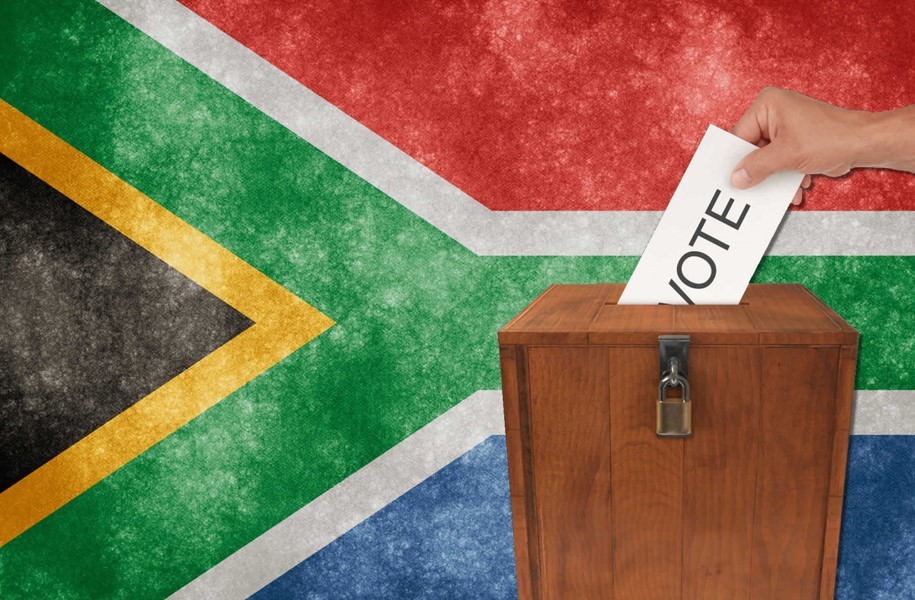South Africa Elections: More of the same or a twist in the tale?


Welcome back to the Vault.
This week, we discuss electoral developments in South Africa as the country prepares for general elections in May. We also spotlight money issues in Zimbabwe, with the rollout of a new currency to tackle persistent hyperinflation.
Feel free to share your thoughts with us, check out our website for the latest policies, and let us know if you need any insight on public policies, regulations, and guidelines in Africa.

On May 29, South Africans will head to the polls for general elections. The vote for President is indirect, with citizens directly voting for the 400 members of the National Assembly, who then elect the President. So, instead of displaying presidential candidates, the ballot will feature images of party leaders.
The spotlight of the elections is on leaders of the three largest political parties: President Cyril Ramaphosa of the African National Congress, John Steenhuisen of the Democratic Alliance, and Julius Malema of the Economic Freedom Fighters.
The Economic Freedom Fighters (EFF)
The Democratic Alliance (DA)
The African National Congress (ANC)
Policy Alignments
Significantly, the three major parties are aligned on the need to revamp the power sector, find millions of employment opportunities for the people and tackle violent crime across the country but only the EFF has been vocal about redistribution of wealth/assets or nationalization of assets – a statement of intent that has not been received warmly by South Africa’s business community.
What to expect
Zimbabwe has announced plans to launch a new currency, the ZiG or Zimbabwe Gold, which will be the country’s sixth currency since 2008. The ZiG is set to officially enter circulation on 30th April and will be fully backed by $285 million in cash and gold.
It is believed that the move for a new currency is designed to tackle hyperinflation that has troubled the country and impacted economic activities. As of March this year, the retiring currency, the Zimbabwean dollar, had lost over 55% of its value to inflation.

Source: Tradingeconomics. Analytics by Policy Vault.
What policy and insight do you seek?
Whether you are a government official, civil society organization, or researcher, our repository provides comprehensive access to public policies, regulations, and guidelines across Africa. We provide insights and intelligence on these regional policies and regulations for research, advocacy, policymaking, and investing.
Get in touch with us here: <mailto:team@policyvault.africa>.
Ghana’s President signs wildlife bill into law
Last week, President Nana Akufo-Addo assented to the Wildlife Resources Management Act, 2024, aligning Ghana with current global best practices on wildlife protection and management. This Act strengthens the regulatory framework for implementing the Forest Wildlife Policy 2012 and the Forest Development Master Plan 2016–2036.
Samuel Jinapor, the Minister of Land and Natural Resources, says the new law demonstrates the government’s commitment to sustainable natural resource management in Ghana. It provides support to wildlife management nationwide and includes clear provisions prohibiting the illegal exploitation of wildlife resources.
New cybercrime regulations in Kenya
Elsewhere on the continent, Kenyan lawmakers have approved new regulations addressing cybercrimes: the Computer Misuse and Cybercrime (Critical Information Infrastructure and Cybercrime Management) Regulations, 2024.
These regulations aim to bolster cybersecurity in vital sectors of the economy, including communications, financial services, and energy. This includes the establishment of a National Cybersecurity Operation Center tasked with preventing cybercrimes through monitoring, investigation, and response efforts.

We’re also tracking the latest current events in the news, and how they may affect the decisions of policymakers. Below are some of the latest developments.
Egypt | EU pledges to provide Egypt with €1 billion in Short-Term Financial Aid
Last week, the European Union announced a loan of over $1 billion to Egypt to support its economy, as part of a larger €5 billion package. The loan aims to help Egypt cope with financial challenges, including those arising from recent conflicts and global events like the war in Ukraine. Another €4 billion is planned for the period 2024-2027.
Niger | Demonstrators demand for exit of US forces
Over the weekend, hundreds marched in Niger’s capital waving flags and calling for the removal of US and all foreign military forces. The protest, echoing past anti-French demonstrations, comes after Niger’s military government terminated a military agreement with the US and welcomed Russian military instructors. It’s noteworthy to know that US forces had been aiding Niger’s government in combating Islamic militants in the Sahel region for years.
Rwanda | Authorities join Nigeria and others in recalling J&J children’s cough syrup
Rwanda’s drug regulatory authorities have recalled a batch of Johnson & Johnson children’s cough syrup due to safety concerns, following Nigeria’s discovery of high toxicity levels in laboratory tests. The syrup, used for treating coughs and allergies in children, has also been recalled in Kenya and South Africa, with an additional batch recalled in South Africa.
The recalled batch, originally manufactured by J&J in South Africa in May 2021, is now under the ownership of Kenvue after a spin-off from J&J last year. Rwanda’s Food and Drugs Authority emphasized that while no adverse events have been reported, the recall is a precautionary measure.
Want more?
Visit www.policyvault.africa to check some of our recently published insights, which provide you with deeper analysis and context of matters at the intersection of public policy and current events.